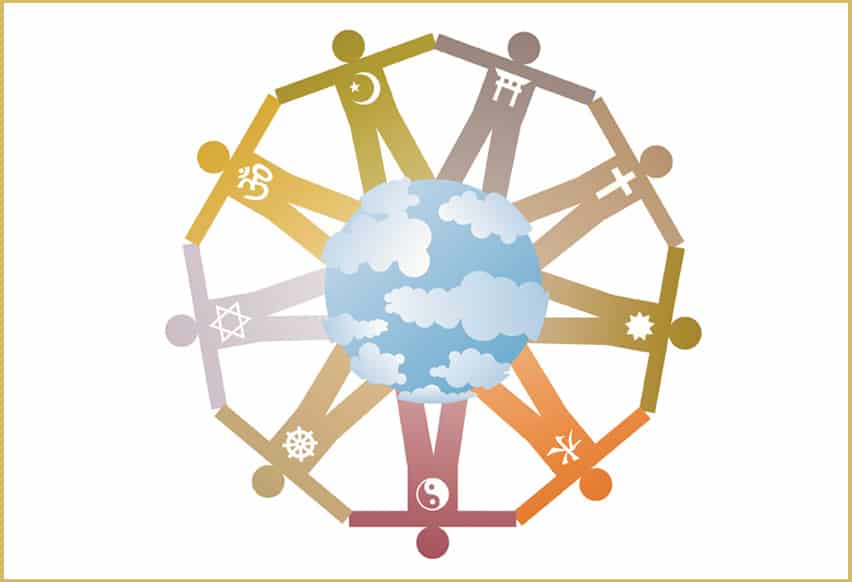Strengthening Our Global Society: Converse’s First Interfaith Studies Graduates

In professions ranging from medicine to education to diplomacy, the ability to bridge cross-cultural and cross-religious divides is vital – and increasingly in high demand.
Converse’s Interfaith Studies program, a minor that launched two years ago and is one of the first of its kind, is part of a growing movement within higher education to equip students for productive, positive, cooperative interaction with people of diverse viewpoints and backgrounds.
Put simply, it is based upon the premise that our local, national, and global societies will grow stronger if we can have meaningful conversations and cooperation with people who are different from us while also remaining true to our own beliefs and identities.
Powering the program was a startup grant from the Arthur Vining Davis Foundation, which provided Converse with funds for research, conferences, and education on how to create such an innovative program. Partnership with the Interfaith Youth Core (IFYC), a national nonprofit that assists in building interfaith programs, also provides training and the sharing of best practices.
“College is our chance to explore and hear new perspectives.” Cassidy Rindge ’19
Converse’s first graduates of the program include Cassidy Rindge, who graduated in May. Having served as student chaplain for two years, Cassidy says that “It’s been cool to see the program grow as the movement grows.”
“At the heart, someone’s religion or non-religion is what motivates them,”says Cassidy, and “College is our chance to explore and hear new perspectives.” She describes Converse as an ideal space for this learning process: “ what do I believe and why is such a challenging thing, and it’s important to find middle ground.”
Dr. Sherry Fohr and Rev. Jason Loscuito serve as co-directors of the Interfaith Studies program. On the curricular side, Dr. Fohr teaches two core courses for the program: World Religion and Interfaith Field Studies.
She also identifies other qualifying courses not only in Religion and Philosophy, but also in History, English, and additional subject areas. Dr. Laura Brown teaches an English class on Women in Protestant Reformations, Dr. Edward Woodfin teaches a history course on The Arab-Israeli Conflict, and Kelly Vaneman teaches a music course on Diverse Cultures and their Musics.
Loscuito teaches the other core course for the minor (Interfaith Literacy and Communication) and arranges campus events like Speed Faithing and Dinner and Dialogue, which hone students’ ability to communicate their viewpoints and to better understand the perspectives of others.
Speed Faithing is a fun twist on the speed dating concept that allows students to present their faith to other students within ten minutes. Dinner and Dialogue hosts speakers for important conversations, such as anti-Semitism in America.
Each person brings their unique set of beliefs and ideals to the conversation, and all explore together the shared values that transcend individual religions – for example, the golden rule and caring for our environment are shared values that come through many sacred texts.
Rev. Loscuito and Dr. Fohr cooperate to funnel these opportunities to students, as well as other opportunities in the larger Spartanburg area.
Rev. Loscuito also finds opportunities for study travel, including a recent weekend conference at Elon University. Rev. Loscuito, Dr. Sherry Fohr, and four students also attended and the Parliament of World Religions conference which was held last year in Toronto and which drew more than 8,000 people for “inclusive dialogue for a more peaceful, just and sustainable world.” Sessions explored factual information on difficult topics like climate change and women’s rights, but there was still time for song and ceremony.
“I prayed with Muslims. I chanted and meditated with Buddhists…We got to see things we talked about in class actually happening at the conference.” Kaylin Dionne ’22
Converse participant Kaylin Dionne ’22 reflected, “I prayed with Muslims. I chanted and meditated with Buddhists. I sang with Christians. I listened to some really emotional stories from Native Americans. The Sikhs would make a free lunch every day for everybody, and the food was amazing.” She added, “We got to see things we talked about in class actually happening at the conference. It really brought to life everything we’d read and discussed.”
The Interfaith Studies Program reflects Converse’s core values of diversity, exploration, and community as well as its Quality Enhancement Plan (QEP).
Converse designed the QEP in 2017 in conjunction with our SACSCOC reaccreditation process. With the theme “Converse Across Boundaries: Learning through Diverse Experiences,” it focuses on fostering within all Converse students the skills to engage with and discuss diverse cultures, perspectives, and life experiences. It is a shared commitment across the faculty to help students gain the ability both to ‘converse’ across social boundaries, and to appreciate what may be the ‘converse’ to their own background (a play on Converse’s name for an initiative tailored to the Converse experience).
As the program grows, so does Converse’s ability to positively impact our world. “To see clearly, decide wisely, and act justly,” in the words of our founder, Dexter Edgar Converse.
Originally published in The Converse Magazine.